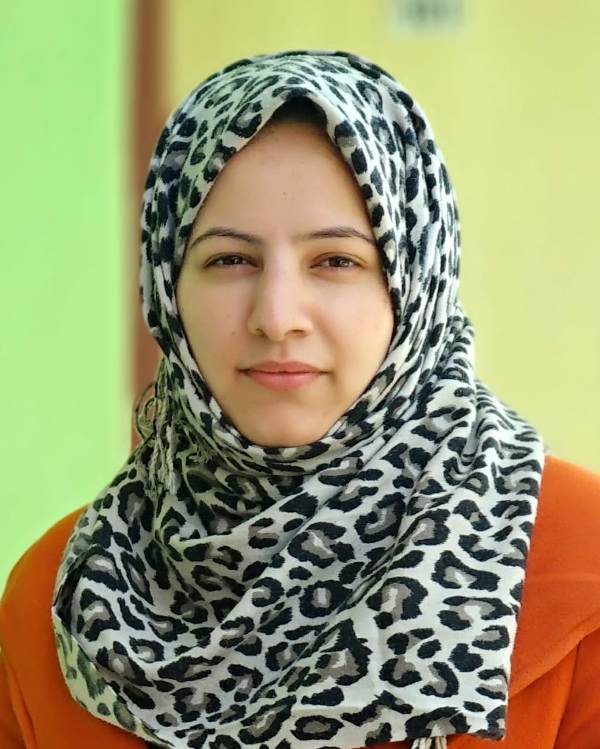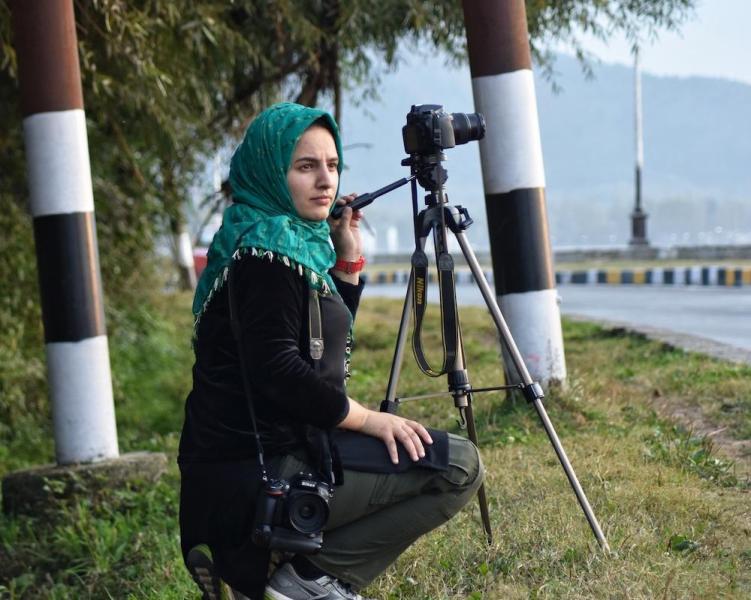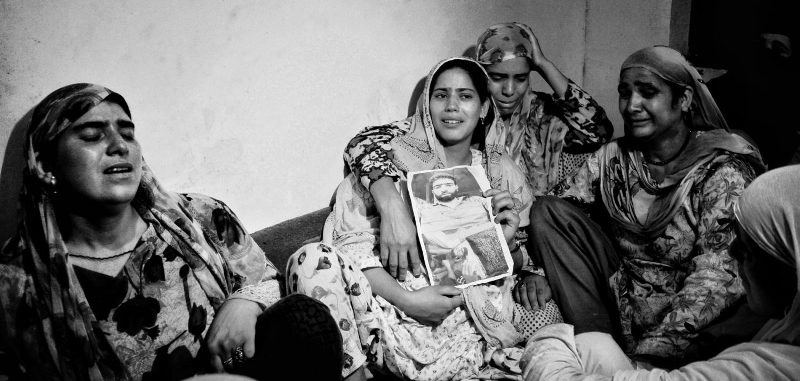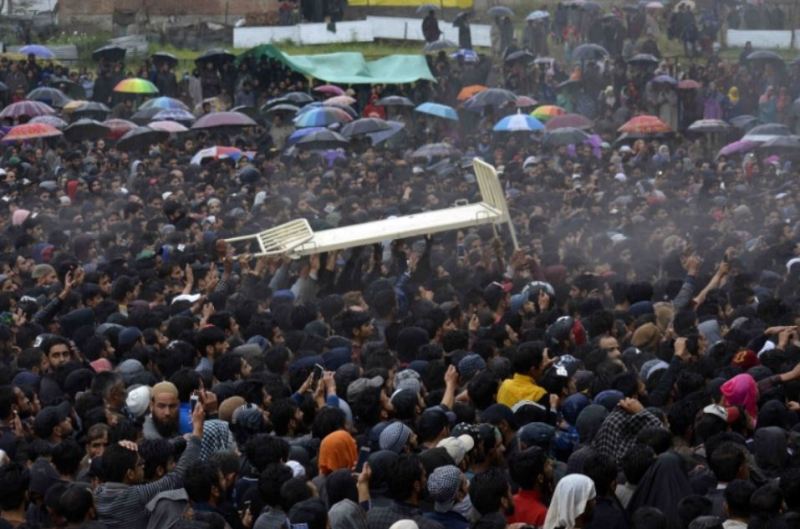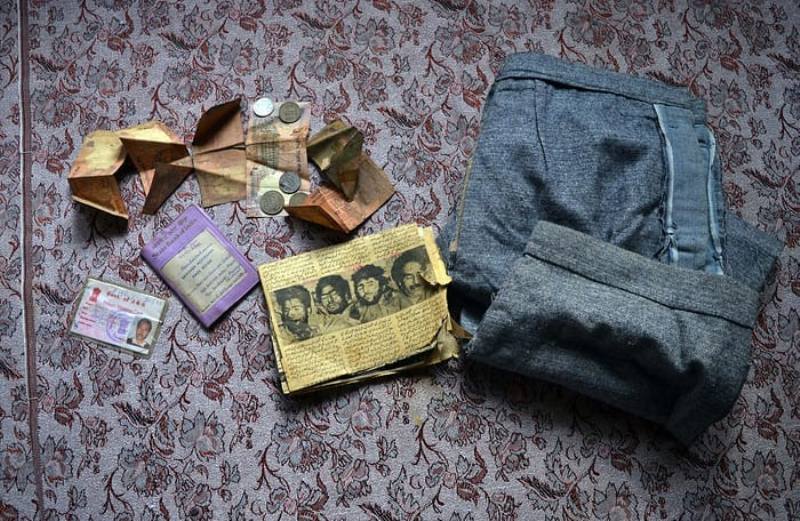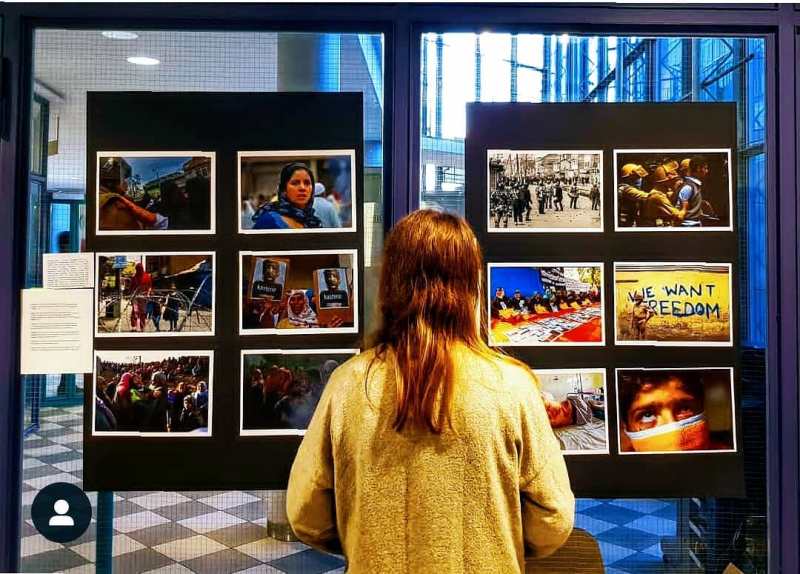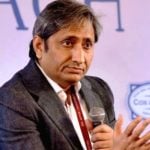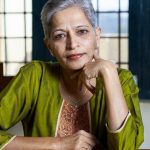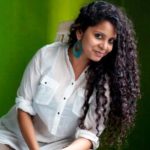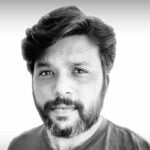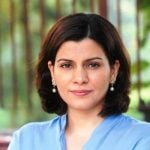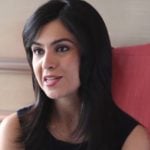Masrat Zahra Age, Boyfriend, Husband, Family, Biography & More
| Bio/Wiki | |
|---|---|
| Nickname | Pyari [1]Masrat Zahra - Facebook |
| Profession | Freelance Photojournalist |
| Physical Stats & More | |
| Height (approx.) | in centimeters- 161 cm in meters- 1.61 m in feet & inches- 5’ 3” |
| Eye Colour | Dark Brown |
| Hair Colour | Black |
| Career | |
| Field | Journalism |
| Associated With [2]The Print | • The Print • Al Jazeera • The Caravan • The Sun • The Washington Post |
| Awards and Achievements | • Selected for the 2022-2023 Knight-Wallace Journalism Fellow [3]Masrat Zahra - Instagram • June 2020: Anja Niedringhaus Courage in Photojournalism Award [4]The Punch Magazine • 2020: Peter Mackler Award for Courageous and Ethical Journalism for “telling stories of the women of Kashmir.” [5]Kashmir Walla |
| Personal Life | |
| Date of Birth | 8 December [6]Masrat Zahra - Twitter 1994 [7]The Hindu |
| Age (as of 2022) | 28 Years |
| Birthplace | Srinagar, Jammu and Kashmir [8]Al Jazeera |
| Zodiac sign | Sagittarius |
| Nationality | Indian |
| Hometown | Srinagar, Jammu and Kashmir |
| School | AKS School of Visual Journalism and Documentary Photography in Srinagar, Jammu and Kashmir [9]Masrat Zahra - LinkedIn |
| College/University | Central University of Kashmir (2016-2018) [10]Masrat Zahra - LinkedIn |
| Educational Qualification | Holds a Master of Arts degree in Convergent Journalism, Audiovisual Communications Technologies/Technicians from the Central University of Kashmir [11]Masrat Zahra - LinkedIn |
| Religion | Islam [12]Al Jazeera |
| Controversy | Booked under the Unlawful Activity Prevention Act for "anti-national" posts Reportedly, Masrat Zahra was framed under the Unlawful Activity Prevention Act (UAPA) in the Cyber Police station, Kashmir Zone. The Kashmir Press Club and Directorate of Information discussed the case with the Kashmir police and made them drop the charges; [13]Outlook however, the police officials later registered the case to initiate the investigation for the concerned matter. [14]Outlook The statement released by the police officials read, "Accordingly, a case FIR No. 10/2020 U/S 13 UA (P) Act and 505-IPC dated 18-04-2020 stands registered in Cyber Police Station, Kashmir Zone, Srinagar and investigation set into motion." [15]Outlook On 20 April 2020, a statement was announced by the Jammu and Kashmir police officials. [16]The Indian Express It read, "Cyber Police Station received information through reliable sources that one Facebook user namely “Masrat Zahra” is uploading anti-national posts with criminal intention to induce the youth and to promote offences against public tranquillity. The Facebook user is also believed to be uploading photographs which can provoke the public to disturb law and order. The user is also uploading posts that tantamount to glorify the anti-national activities and dent the image of law enforcing agencies besides causing disaffection against the country." [17]The Indian Express According to sources, the post because of which Masrat was booked wasn't specified by the police officials, but an indication was given to two posts. [18]The Caravan Reportedly, in one post, Masrat had mentioned the story of a man who was gunned down by the Indian Army in 2000 [19]The Print with eighteen bullets. [20]Masrat Zahra - Twitter 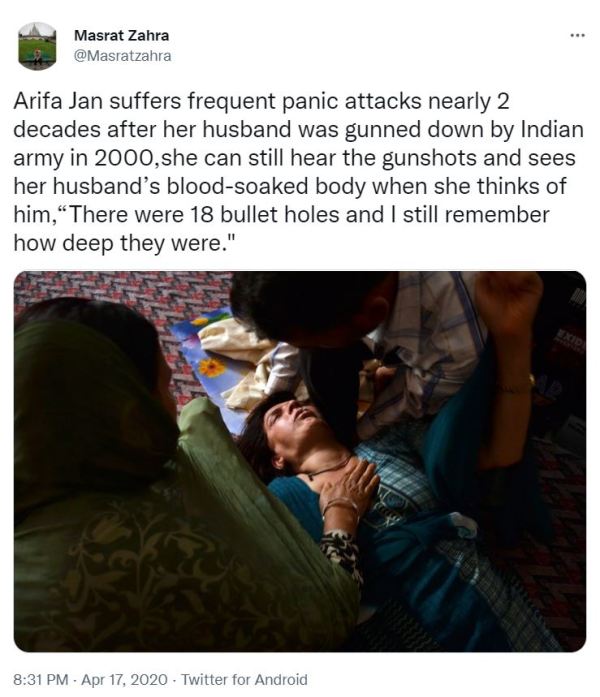 In the other post, Masrat showed a woman standing in front of a devastated house [21]The Caravan with a caption that read, "Pehlay yeh ghar meray liaye bus ik makaan tha, ab yeh jagah meray liaye eik astaan hai (First, this house was just a home for me. Now, this place is a shrine for me),’ said Madhosh Balhami, the poet who lost his 30-years of poetry when his house was destroyed by armed forces in a gun battle." [22]Masrat Zahra - Instagram 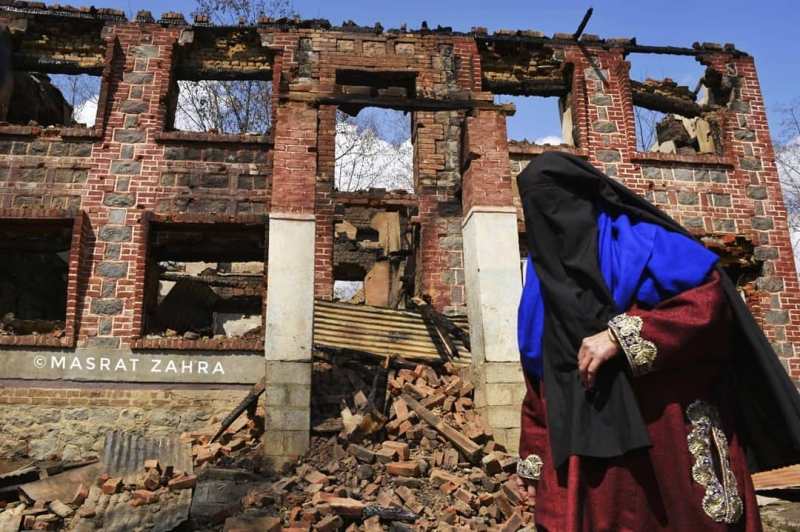 In an interview, Masrat claimed that the police officials might have booked her because she once mentioned Burhan Wani, a commander of Hizbul Mujahideen - designated as a terrorist group, as "Shaheed" (martyr). [23]News 18 While talking about this in the interview, Masrat said, "Two small apostrophes around the word Shaheed could have kept me away from harm's way. I am not sure though." [24]News 18 |
| Relationships & More | |
| Marital Status | Unmarried |
| Family | |
| Husband/Spouse | N/A |
| Parents | Father- Mohammad Amin Dar [25]The Wire (former truck driver) Mother- Fatima [26]The Wire (homemaker) [27]Al Jazeera 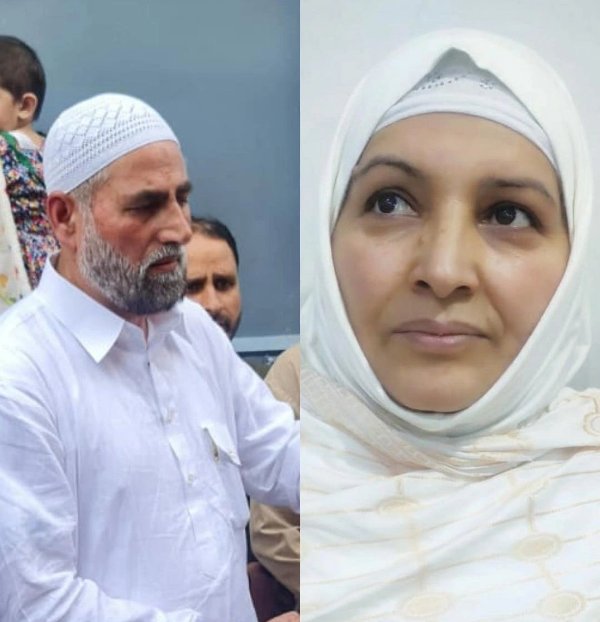 |
| Siblings | Brother- Muddasir Dar [28]Masrat Zahra - Facebook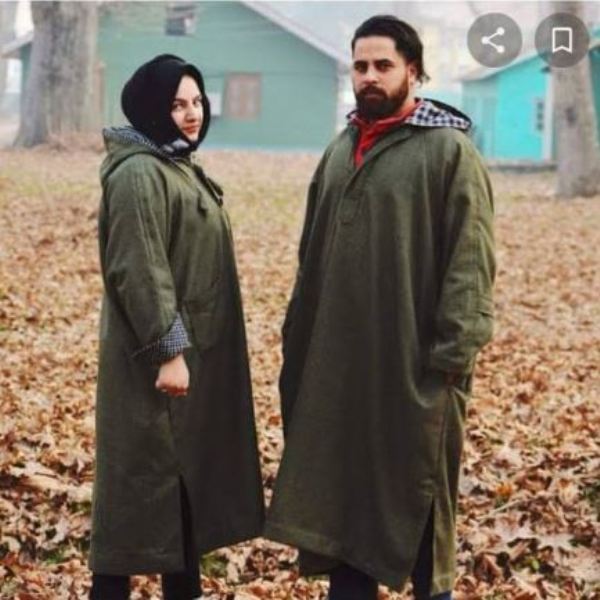 Sister- Fatima Alia [29]Masrat Zahra - Facebook |
Some Lesser Known Facts About Masrat Zahra
- Masrat Zahra, a freelance photojournalist from Hawal, Srinagar, [30]The Hindu is one of the leading names in the field of journalism in India. She draws attention to the alleged Human Rights violations in Kashmir and the repercussions of the conflicts between security personnel and civilians through her camera work, especially from a woman’s perspective.
- Masrat majorly covers the stories from Srinagar, Jammu and Kashmir.
I think all my pictures reflect day-to-day life in my homeland. In a conflict zone like ours, every picture in its own way, even in this beautiful Himalayan landscape, describes the tragedy of Kashmir.” [31]Al Jazeera – Masrat Zahra
- According to Masrat, she was a Science student in school as her mother believed ‘doctor’ was a conventional profession for women, [32]The Punch Magazine. Still, with time, she developed her interest in journalism and pursued further studies in the same.
- In an interview, Masrat revealed that looking at photojournalism as a career was difficult for her as her parents wanted her to settle for a government job. [33]Al Jazeera According to her, her parents were worried about the social and cultural barriers that could be in her way if she chose photojournalism as a career. [34]Free Press Kashmir While talking about this in the interview, Masrat said,
It was hard for me to convince my parents as there were only a few women journalists and visual storytellers in Kashmir. They did not understand the role of a woman in this field. Therefore, for them, it was a very rebellious decision. Sometimes, my parents would even hide my camera. But I would still go out, sometimes asking my friends for their cameras, sometimes clicking with a phone. But I never stopped clicking. They are extremely scared for me of course. I was hit by a pellet fired by the armed forces once, that time the fear increased manifold. Then there is societal pressure as well. People talk and blame my parents for a ‘bad’ upbringing. I go through a lot of moral policing. Whenever I come home late after a day of shoot, the neighbours raise their eyebrows and talk amongst themselves.” [35]Free Press Kashmir
- According to Masrat Zahra, her first assignment was to cover the after-effects of the death of Firdous Ahmed Khan, a labourer, who was killed in an open fire between the rebels and the Indian Army at Harkiora area in the Kakpora village of South Kashmir. [36]Free Press Kashmir According to her, Firdous wasn’t a stone pelter nor he was involved in protesting. [37]Free Press Kashmir Masrat met Firdous’ mourning family and heard their side of the story. While explaining the situation at Firdous’s house in her article, Masrat wrote,
But when I met Firdous’ widow Ruksana, then 25 and soon to give birth to their second child, she hugged me and cried and told me about the pain of losing her husband. She was burdened and desperate to speak, and could open up to another woman. While her story made me extremely sad, I felt a responsibility to tell it. I watched Ruksana’s two-year-old daughter embracing her father on a metal bed, kissing and touching his face for the last time before he was separated from them forever and another empty bedframe returned to the hospital.” [38]Al Jazeera
- Reportedly, Masrat covered the funeral of Zakir Rashid Bhat (aka Zakir Musa), which turned out to be one of the most challenging reporting for her. [39]Al Jazeera The inhumation of Zakir Musa – a student, who later became a militant and the chief of Ansar Ghazwat-ul-Hind – was held in the Noorpora village in the Pulwama district of Jammu and Kashmir. [40]Al Jazeera According to Masrat, it was a day with lots of challenges as the roads were full of security checkpoints, and the entry of journalists was restricted. [41]Al Jazeera Reportedly, Masrat somehow managed to get inside the area of the place but couldn’t capture Musa’s picture; however, she managed to take a picture of a bed on which his body was kept. [42]Al Jazeera In an interview, in 2020, Masrat shared her thoughts on that empty bed that she captured at Musa’s funeral. She said,
For me, the empty bed had a different story to tell, far more haunting than the story it told with a dead body on it. It was the void the frequent killings of fighters and ordinary women and men leave behind in their families. This picture makes me think of how these beds carry the bodies of young men, women, children, mothers, fathers, sisters, brothers before they are gone forever. I think about families coming to kiss them for the last time on those beds. These beds share a connection of death and grief. Although there are largely men in this picture, I imagine the women – a mother, sister, wife or daughter, looking at the bed a loved one once slept in, and the loneliness and emptiness this brings. I think of their pain.” [43]Al Jazeera
- While glorifying Zakir Musa as a fighter and a martyr, Masrat said,
The bodies of Kashmiris killed by the Indian armed forces are not taken to the graveyard in a closed coffin.” [44]Al Jazeera
- Reportedly, one of the posts shared by Masrat Zahra about the killing of Abdul Qadir Sheikh, who was gunned down by the Indian Army in 2000, came out to be called an “anti-national” post. [45]The Indian Express The story was covered by Masrat almost two decades after the demise of Abdul Qadir. [46]Masrat Zahra – Twitter According to Masrat, she met Abdul Qadir’s family and found that his wife, Afra Jan, still held her husband’s belongings, which included some blood-stained loose change, newspaper cuttings, and many more. [47]Masrat Zahra – Instagram While sharing the story on social media, Masrat revealed that Afra Jan had frequent panic attacks even two decades after his husband’s killing. [48]Masrat Zahra – Instagram
- On 4 March 2020, Masrat Zahra’s work – for the panel discussion on ‘Self-determination and Human Rights in Kashmir’ and exhibition – was displayed at Juridicum in Erlangen Nuremberg, Germany. [49]Masrat Zahra – Instagram
- In an interview, Masrat revealed that she faced ‘male dominance’ in her career. While talking about it, she said,
There have been times when I was pushed over by male journalists while shooting protests. Once I was called a Mukhbir (state informer) on social media, the male-dominated press associations did not support me at that time. I stopped my work for a month, but I came back to it again.” [50]Free Press Kashmir
- In 2021, in an interview, Masrat disclosed a story from one of the chapters of her life, which influenced her to become a journalist. Zahra shared that while visiting different places such as shrines with her mother and grandmother, she noticed only male journalists everywhere in the Kashmir region, and she witnessed that women in the valley were uncomfortable with the presence of only male journalists following which Masrat decided to become a journalist. Masrat added,
I thought to myself, “No, there should be someone from Kashmir, who will talk about what is happening in Kashmir.” There are many unheard stories (from Kashmir)—I wanted to tell them. Among these were the stories of women who were not comfortable with the male gaze. For this reason, I wanted to be a photojournalist.” [51]ASAP Connect
- Reportedly, on 6 July 2021, Masrat’s father, Mohammad Amin Dar, was beaten by six policemen by pulling him aside while he was looking for an auto-rickshaw with his wife, Fatima. [52]Newslaundry The incident took place on the main road of Batamaloo in Kashmir. [53]Newslaundry According to sources, the police officials stated the allegations against the officials by the family were a part of their plan to be in the news; [54]Newslaundry however, Masrat shared a tweet showing the wounds on her father’s arm [55]Newslaundry and also claimed that Aijaz Ahmed, then the head of the Batamaloo police station, called her ‘anti-state.’ [56]Newslaundry
Posting the picture of my father who was thrashed by police. One can clearly see his bruised arm. I didn't want to post these pictures but yesterday's police statement is ridiculous and they cannot thrash people in the day and at the end of day when questioned deny the thrashing. pic.twitter.com/TM6wzEXUdO
— Masrat Zahra (@Masratzahra) July 27, 2021
References/Sources:

